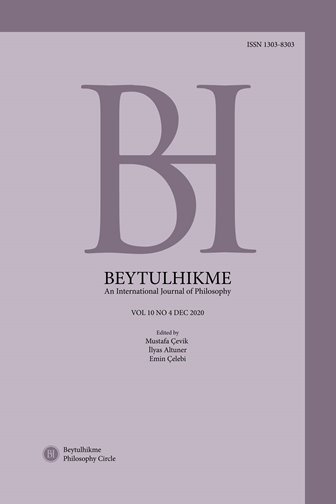Author :
Abstract
Moshe Chaim Luzzatto (Ramhal), eserleri Yahudi dini-felsefi geleneğinin gelişimini etkileyen en yetkili dini filozoflardan ve kabalistlerden biridir. Günümüzde Ramhal'ın eserleri en heyecan verici ve basit Kabalistik metinler arasında yer almakta ve etik çalışmaları yüzlerce yıldır birçok Yahudi dini eğitim kurumunda incelenmektedir. Bu araştırma, Ramhal'ın insan amacı doktrininin araştırılmasına ve bu amaca ulaşmanın yollarına ilişkin görüşüne ayrılmıştır. Makale, yazarın Yahudi dini doktrininin temellerini Kabalistik bir bakış açısıyla yorumlamasını temsil eden “Derekh Hashem” (“Tanrı'nın yolu”) ve “Da'at Tevunot” (“bilerek kalp” veya “nedenleri bilmek”) iki yetkili esere dayanmaktadır. Makale, Ramhal'ın insanların bu hedefe ulaştıkları ve ulaştıkları bağlam hakkındaki görüşünü ve doğalarının ve dünyanın doğasının eksikliklerini ortadan kaldırmanın yollarını inceliyor ve özellikle emirleri yerine getirme, dünyayı algılama, Acı çekme, reenkarnasyon ve cehennemde olma gibi bu tür arınma örneklerini anlatıyor.
Keywords
Abstract
Moshe Chaim Luzzatto (Ramhal) is one of the most authoritative religious philosophers and kabbalists whose works influenced the development of Jewish religious-philosophical tradition. Nowadays, Ramhal’s works are mentioned among the most exciting and straightforward Kabbalistic texts and his ethical works are studied in many Jewish religious educational institutions for several hundreds of years. This research is devoted to the investigation of Ramhal’s human purpose doctrine and his view of the ways to achieve this purpose. The paper is based on the two authoritative works “Derekh Hashem” (“The Way of God”) and “Da’at Tevunot” (“The Knowing Heart” or “Knowing the Reasons”) representing the author’s interpretation of the fundamentals of Jewish religious doctrine from a Kabbalistic perspective. The paper examines Ramhal’s view of the context that humans get and achieve this goal in and the ways of eradicating the deficiencies of their nature and the nature of the world as well as describes the examples of such purification, in particular, keeping the commandments, perceiving the world, suffering, reincarnation, and being in Hell.
Keywords
- Akopyan O. (2015). Kabbala Dlya Nachinayushih. [Kabbalah for Beginners]. https://arzamas.academy/mag/136-kabbala. (Accessed 09.07.2020).
- Bible (2015). https://www.biblegateway.com/versons/Amplified-Bible- AMP/#booklist. (Accessed 09.07.2020).
- Dan J. (2006). Kabbalah: A Very Short Introdiuction. Oxford: Oxford University Press.
- Fontaine R. & Glasner R. & Veltri G. & Leicht R. (Eds.). (2011). Studies in the History of Culture and Science: A Tribute to Gad Freudenthal. Boston, Leiden: Brill.
- Iudaizm i evrei [Judaism and Jews]. (2015). Pereselenie Dush v Evrejskoj Tradicii. [Reincarnation in Jewish Tradition]. https://toldot.ru/pereselenieDush.html. (Accessed 09.07.2020).
- Jacobson S. (2008). Kabbala o Dvojstvennosti Mira. [Kabbalah about Duality of the World] Lehaim, 194. https://lechaim.ru/ARHIV/194/jecob.htm. (Accessed 09.07.2020).
- Ramhal (2003). Midrash Rasskazyvaet. [The Midrash Says]). http://lib.ru/RELIGION/IUDAIZM/WEJSMAN/midr1.txt. (Accessed 09.07.2020).
- Ramhal (2012). Da’at Tevunot. https://toldot.ru/cycles/cycles_338.html. (Accessed
- Ramhal (2014). Derekh Hashem. https://toldot.ru/cycles/cycles_473.html. (Ac-
- Rav A. Katz. (2013). Ramhal. https://toldot.ru/rabbanim/rabbanim_21736.html. (Accessed 15.04.2020).
- Rav Asher Kushnir (2012). Derekh Hashem. (Video Lectures). https://toldot.ru/tv/video/video_14663.html. (Accessed 09.07.2020).
- Rav L. A. Savrasov (2005). Ramhal. https://toldot.ru/rabbanim/rabbanim_355.html.
- Rav Reuven Kuklin (2011). Rasskazhite pro Pereselenie Dush! [Tell us about Reincarnation]. https://toldot.ru/urava/ask/urava_6393.html. (Accessed
- Sclar, D. (2016). Adaptation and Acceptance: Moses Ḥayim Luzzatto's Sojourn in Amsterdam among Portuguese Jews. AJS Review, 40 (2), 335-358.
- The Jewish Encyclopedia in Russian on the Web (a). (2016). Kabbalah. https://eleven.co.il/judaism/mystic-kabbalah-magic/11899. (Accessed
- Torchinov E. (2000). Vvedenie v Buddologiyu. Kurs Lekcij. [Introduction to Bud- dhism. Lectures]. St. Petersburg: Sankt-Peterburgskoe Filosofskoe Obshestvo. Öz: Moshe Chaim Luzzatto (Ramhal) is one of the most authoritative religious philosophers and kabbalists whose works influenced the development of Jewish religious-philosophical tradition. Nowadays, Ramhal’s works are mentioned among the most exciting and straightforward Kabbalistic texts and his ethical works are studied in many Jewish religious educational institutions for several hundreds of years. This research is devoted to the investigation of Ramhal’s human purpose doctrine and his view of the ways to achieve this purpose. The paper is based on the two authoritative works “Derekh Hashem” (“The Way of God”) and “Da’at Tevunot” (“The Knowing Heart” or “Knowing the Reasons”) representing the author’s interpretation of the fundamentals of Jewish religious doctrine from a Kabbalistic perspective. The paper examines Ramhal’s view of the context that humans get and achieve this goal in and the ways of eradicating the deficiencies of their nature and the nature of the world as well as describes the examples of such purification, in particular, keeping the commandments, perceiving the world, suffering, reincarnation, and being in Hell.. Anahtar Kelimeler: Moshe Chaim Luzzatto, Ramhal, Yahudi araştırmaları, Kabbala, insan amacı öğretisi.





